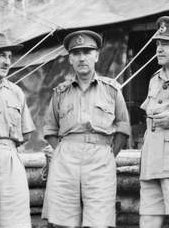![]() The Pacific War Online Encyclopedia
The Pacific War Online Encyclopedia
|
| Previous: Hermes, British Light Carrier | Table of Contents | Next: Hester, John H. |

Australian War Memorial #151137
Cropped by author
Edmund Herring was a Rhodes Scholar (1912) who joined the Officers' Training Corps at Oxford just before the First World War broke out. He was commissioned into the artillery and served in the British Army in France and the Middle East. He returned to civilian life after the war, completing his
law degree at Oxford before returning to Australia and becoming a
successful barrister. He was active in Conservative politics and was a member of the
White Guard, a secret anti-Communist organization. However, he became
active in the Australian militia and was a friend of Thomas Blamey.
Herring was called to the colors in 1939 as commander of the 6 Division artillery. He served as
commander of 6 Division in
North Africa, though not in combat, and returned home
with it in February
1942. He opposed Blamey's appointment as commander of Australian
military forces, but this did not destroy their friendship. Later that
year Herring was appointed commander of
Australian troops in New
Guinea, a largely administrative post, in place of Sydney Rowell, who did not get along with Blamey.
Herring took command of I Australian Corps in August 1943 and led the Australian troops who fought in the Papua campaign, surviving an aircraft crash on 28 September 1943 uninjured. That same month, he confirmed the death sentences of 22 Papuans convicted of murder and treason, which created a controversy when made public in 1978. Herring also created controversy in his relations with Savige, the commander of 3 Division, and Barbey, the American 7 Amphibious Force commander. It may be for these reasons that Herring retired from the army in 1944 to become chief justice of Victoria, in spite of having no prior experience as a judge. Herring also served postwar as Lieutenant-Governor of Victoria (1945-1972) and as Director of Recruiting during the Korean War (1950-1951).
The official Australian war historian described
Herring as "small and quiet" but with impressive diplomatic skills.
Intensely competitive, he also had the knack of thoroughly dressing down a man without raising his voice.
| 1892-9-2
|
Born at Maryborough, Victoria |
|
| 1913 |
Enlists in King Edward's Horse |
|
| 1914-12 |
Second lieutenant |
99 Brigade, Royal Field Artillery |
| 1922 |
Legal staff, 3 Cavalry Division |
|
| 1923 |
Commander, 44 Battery, 22 Brigade, Australian Field Artillery |
|
| 1929 |
Lieutenant colonel |
|
| 1939 |
Brigadier
general |
Commander, Royal Artillery, 3 Division |
| 1939 |
Commander, Royal Artillery, 6
Division |
|
| 1941-8 |
Major
general |
Commander, 6 Division |
| 1942-2
|
Commander, 7 Military District |
|
| 1942-3 |
Commander, Northern Territory
Force |
|
| 1942 |
Commander, II Corps |
|
| 1942-10 |
Lieutenant general |
Commander, New Guinea Force |
| 1943-8 |
Commander, I Australian
Corps,
New Guinea |
|
| 1944-2-10 |
Retires from the Army. Becomes chief justice of Victoria. |
|
| 1945 |
Lieutenant-Governor of Victoria |
|
| 1972 |
Retires |
|
| 1982-1-5 |
Dies at Camberwell, Melbourne |
References
Australian Dictionary of Biography (accessed 2011-6-18)
Australian War Memorial (accessed 2011-6-18)
Generals.dk
(accessed 2008-3-8)
The Pacific War Online Encyclopedia © 2007-2008, 2011 by Kent G. Budge. Index